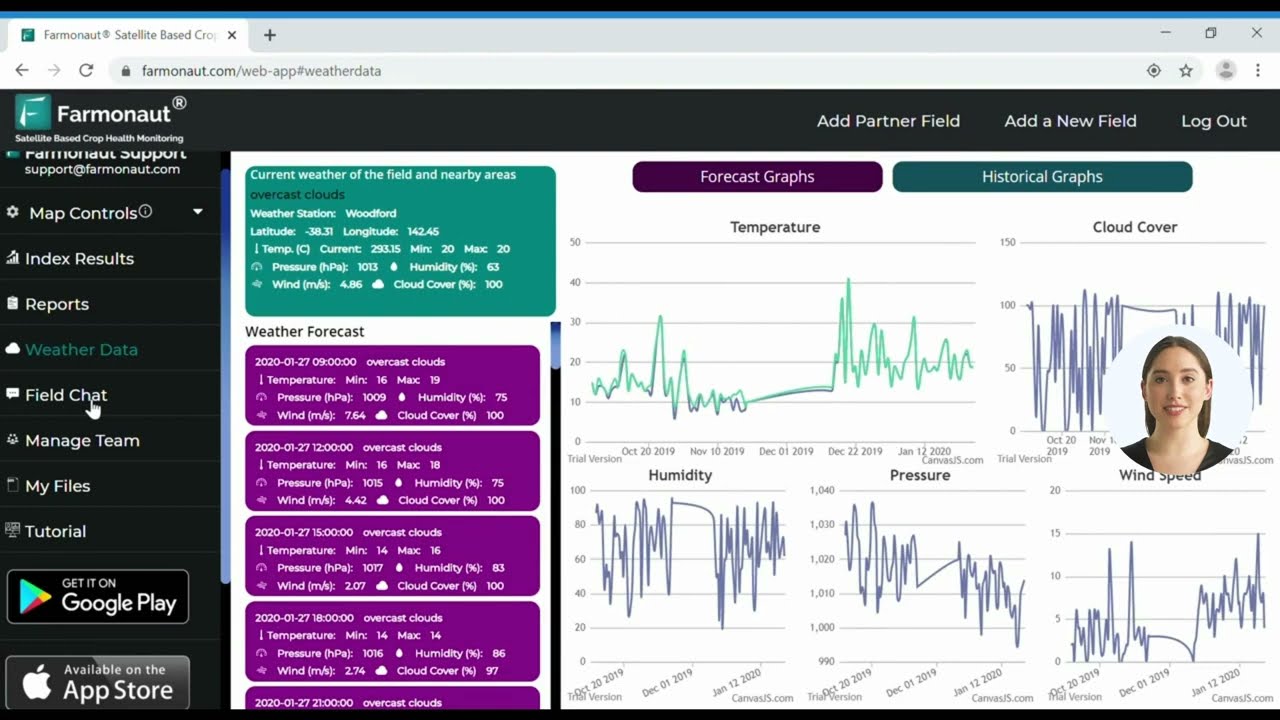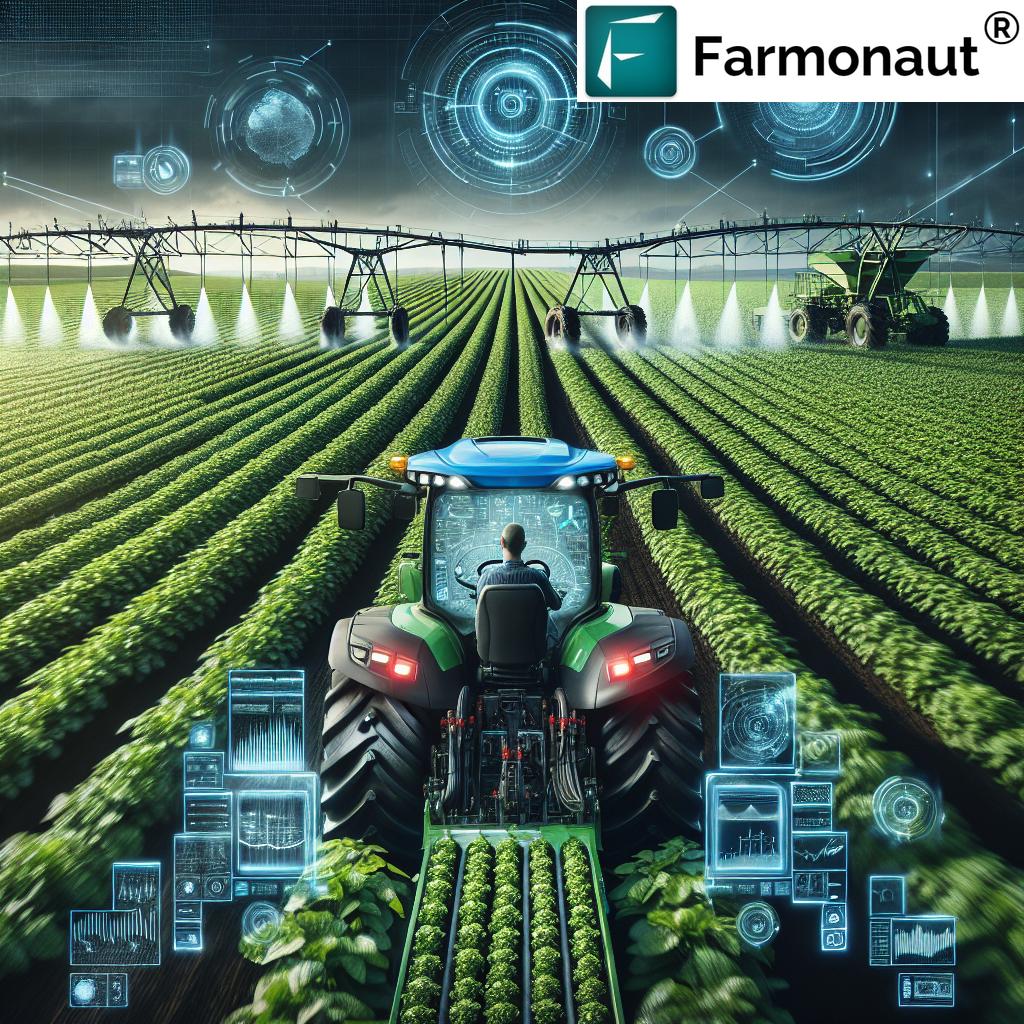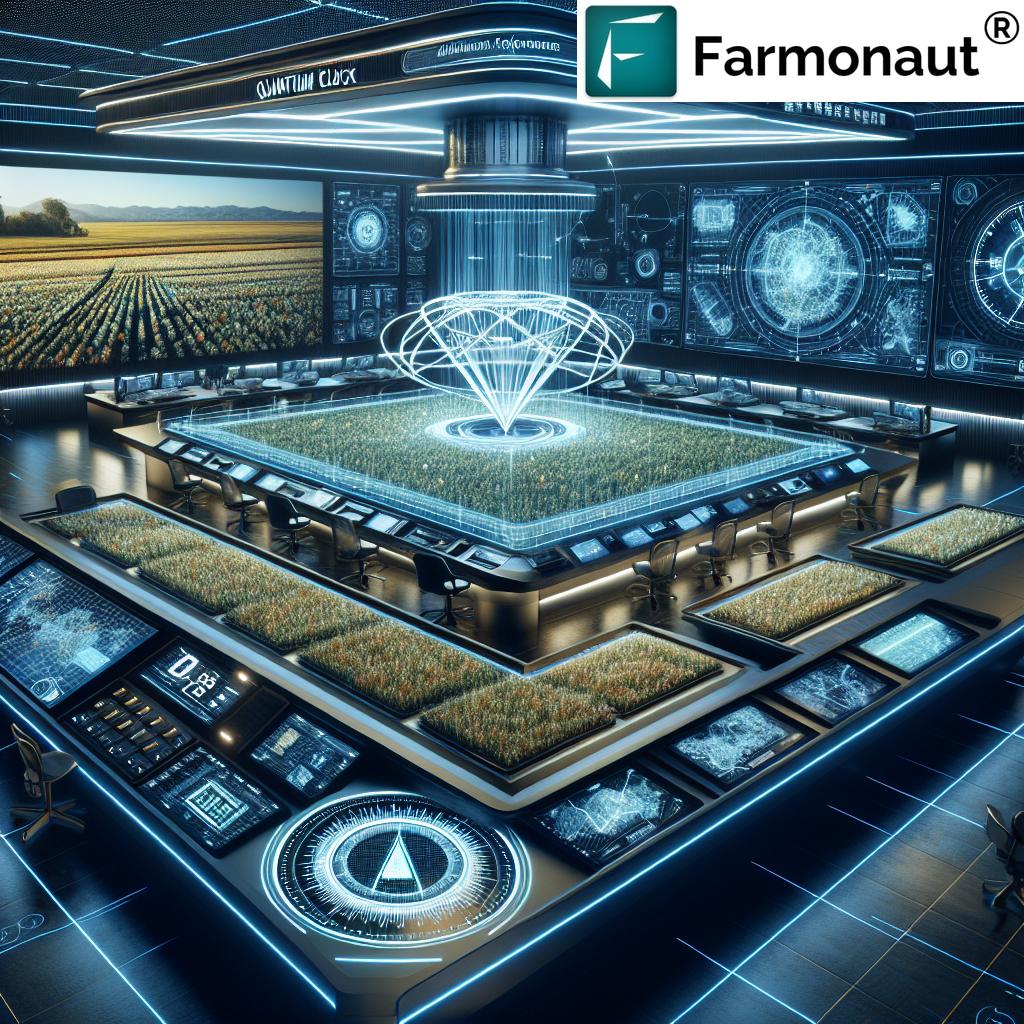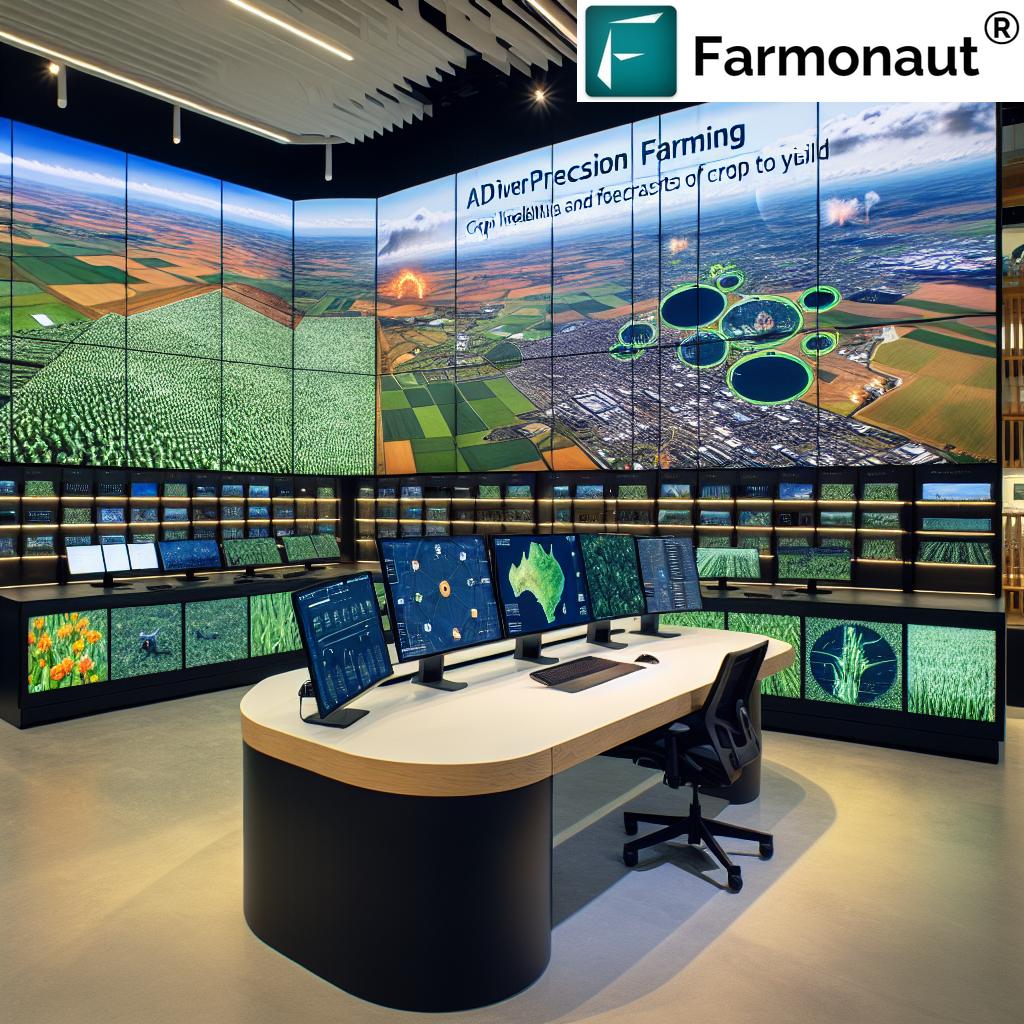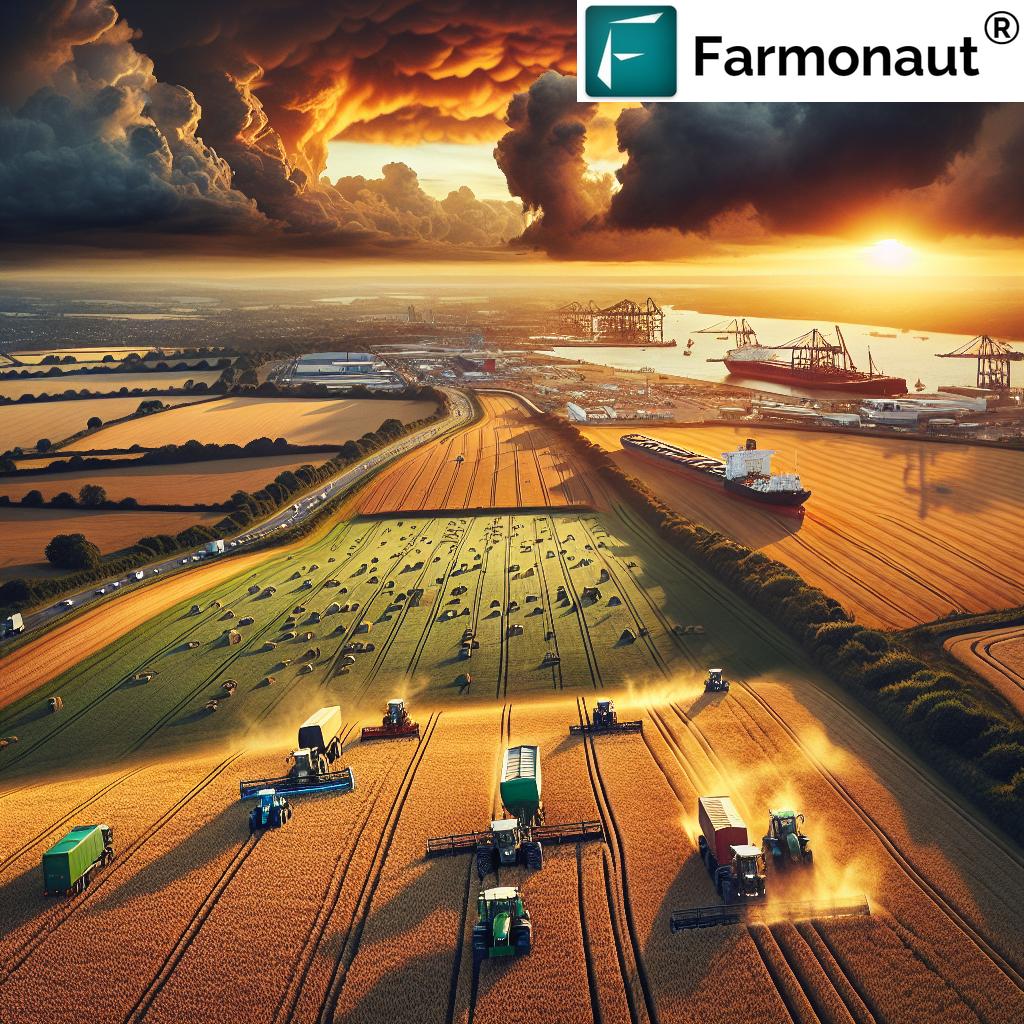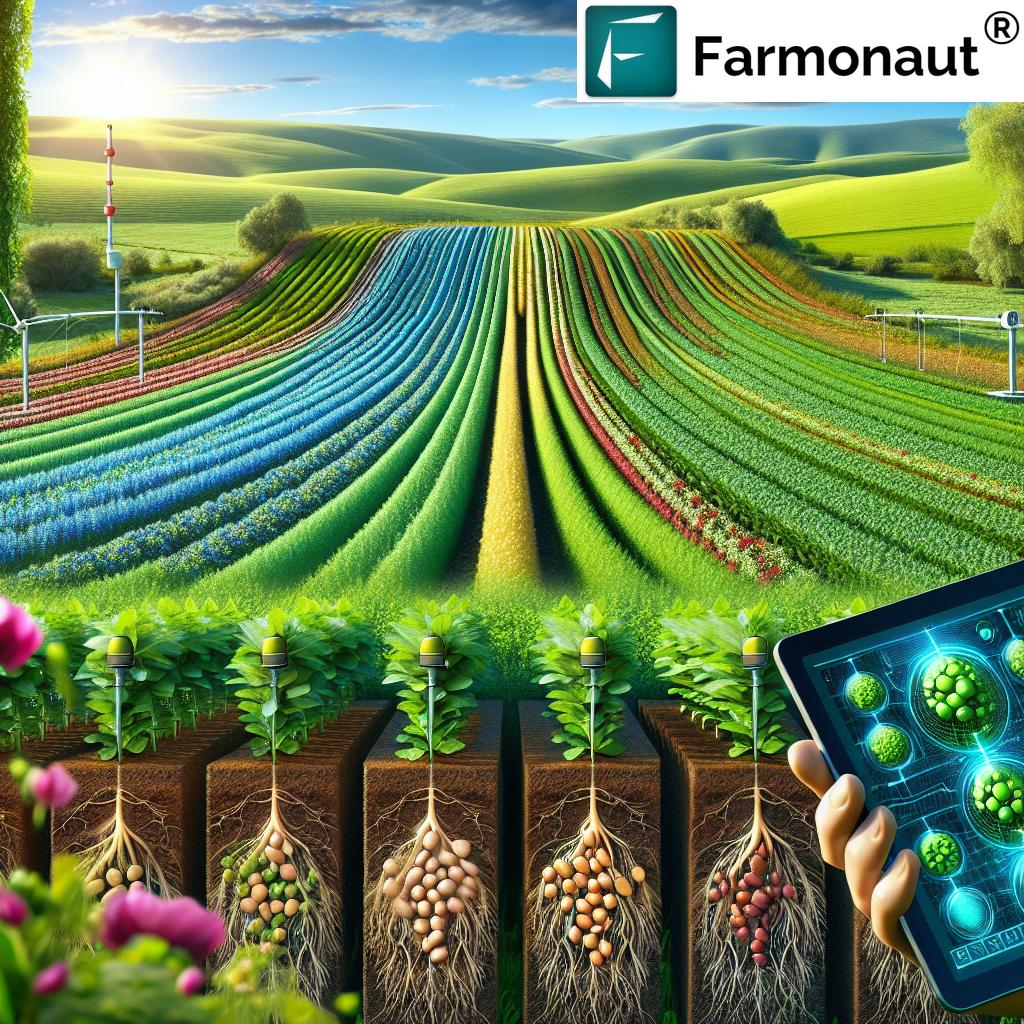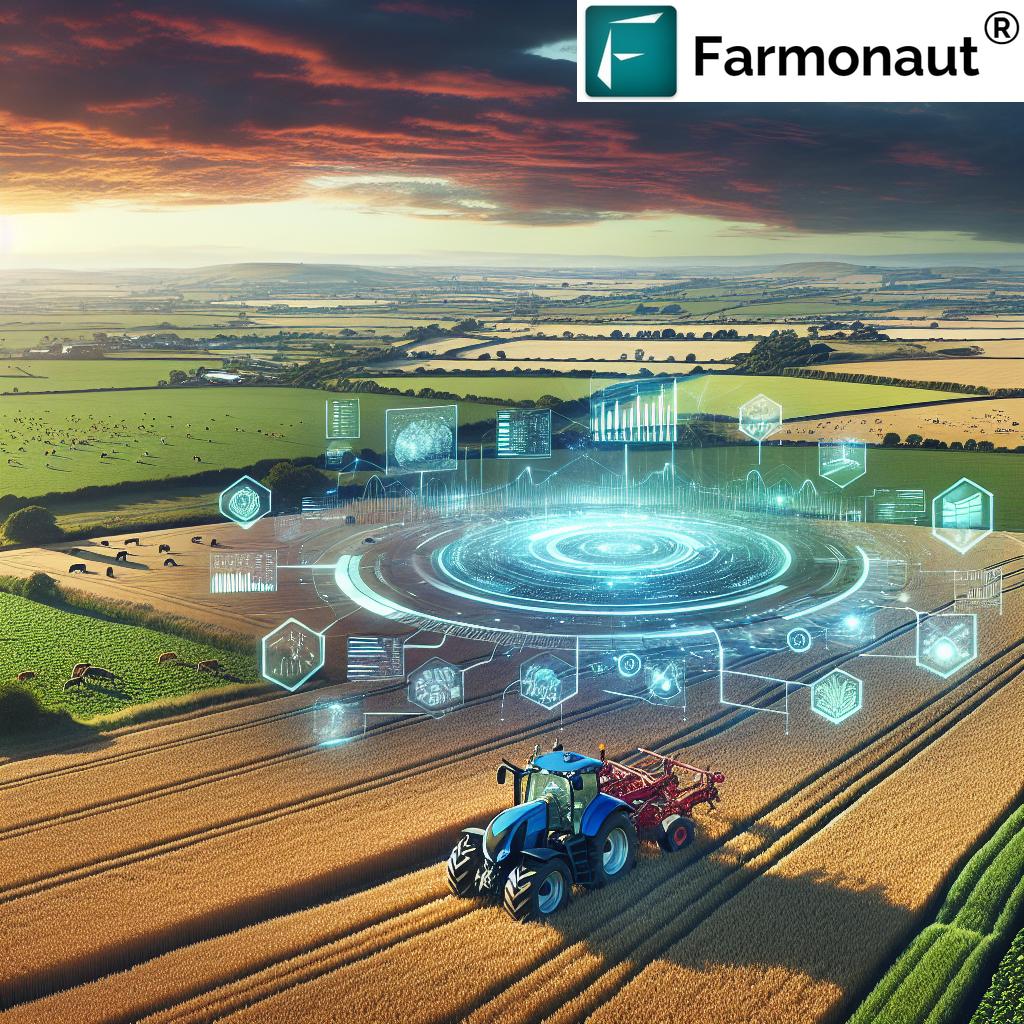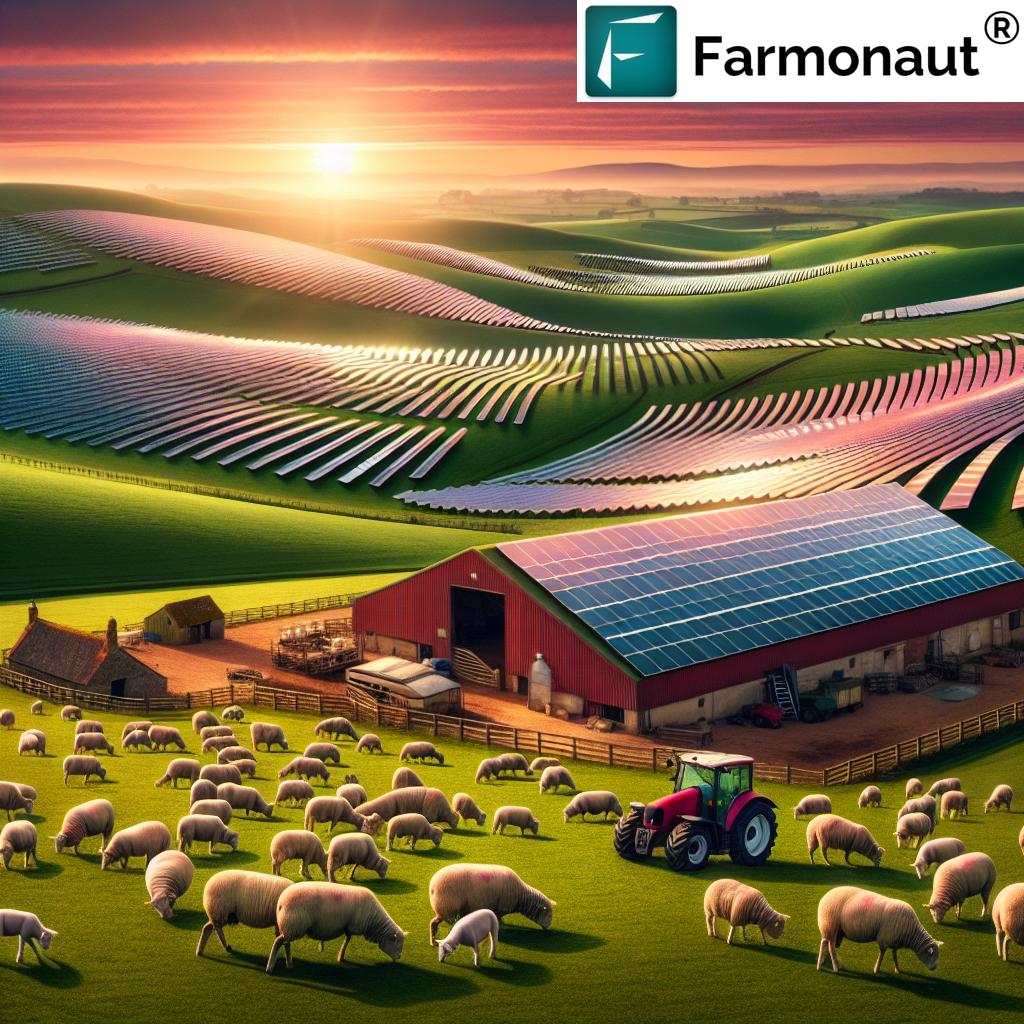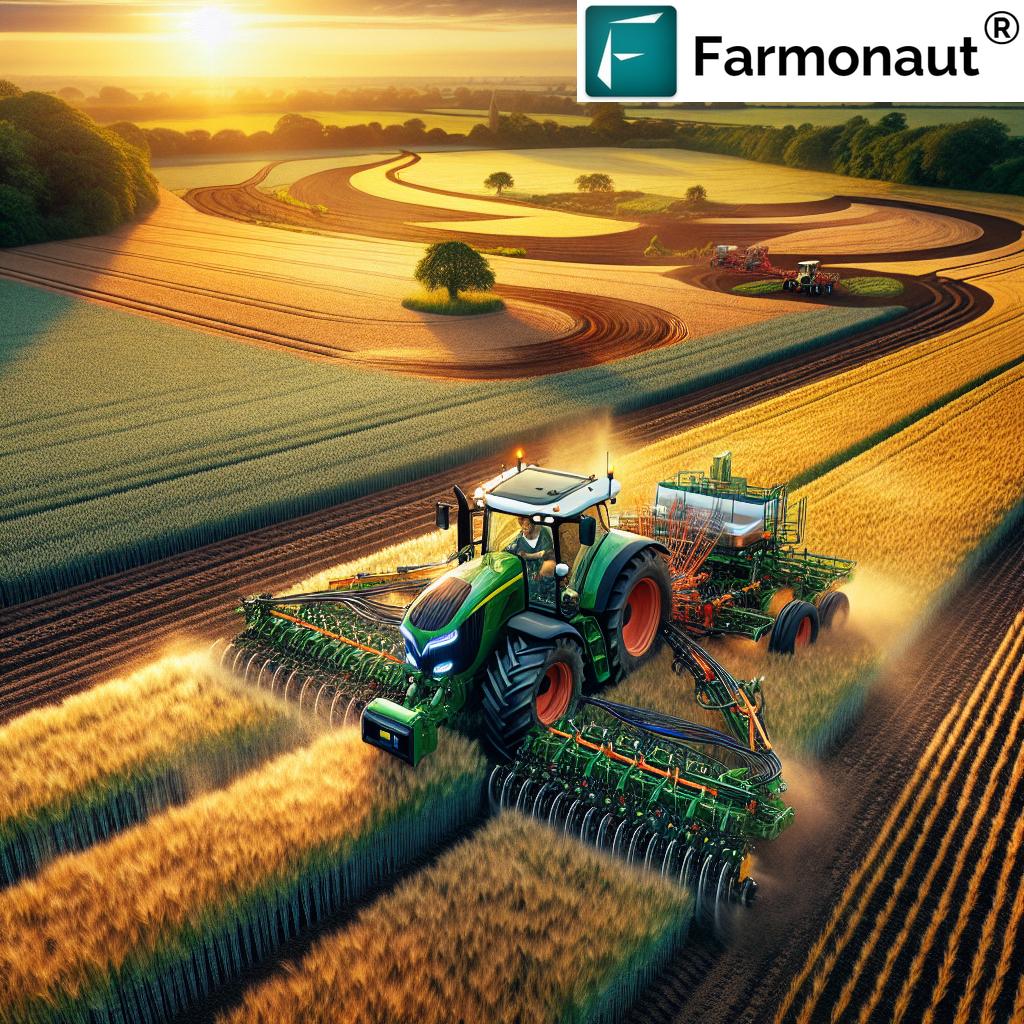Revolutionizing UK Farming: Farmonaut’s Smart Agriculture Solutions for Sustainable Crop Management and Precision Farming
“UK farmers using precision agriculture technology report up to 20% increase in crop yields.”
In recent years, the agricultural landscape in the United Kingdom has undergone a remarkable transformation, driven by the rapid adoption of precision agriculture technology and smart farming solutions. As we delve into this comprehensive industry report, we’ll explore how digital farming tools are revolutionizing UK agriculture, from advanced agricultural data analytics to cutting-edge crop monitoring systems. Join us as we uncover the latest trends, government initiatives, and market conditions shaping the future of farming in the UK.
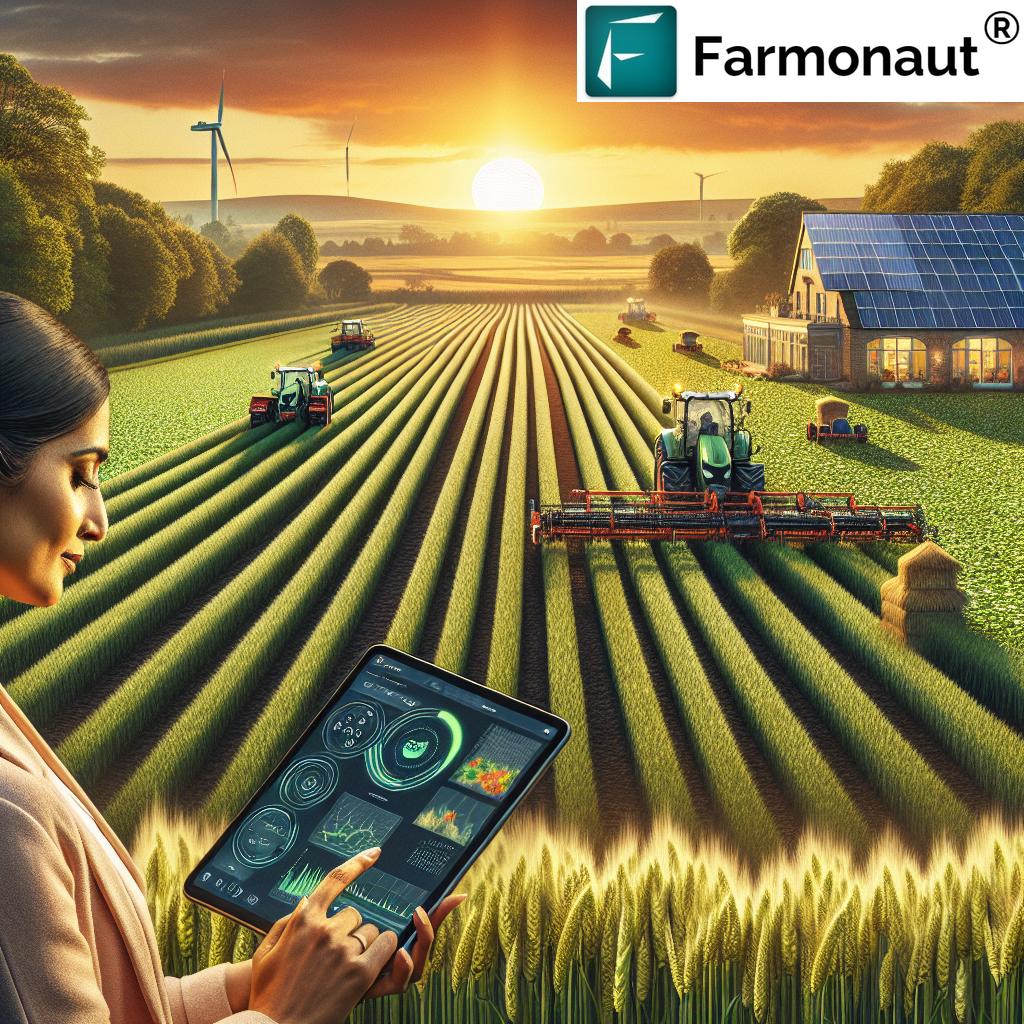
The Rise of Precision Agriculture in the UK
The agricultural sector in the UK has been experiencing a significant shift towards precision farming practices. This transition is characterized by the integration of advanced technologies that enable farmers to make data-driven decisions, optimize resource use, and enhance overall productivity. Let’s explore some key aspects of this agricultural revolution:
- Farm Management Software: Digital platforms that help farmers streamline operations, track crop health, and manage resources efficiently.
- Agricultural Drone Applications: Unmanned aerial vehicles equipped with sensors and cameras for crop monitoring, pest detection, and mapping.
- Soil Health Monitoring: Advanced sensors and analytics tools that provide real-time data on soil conditions, enabling precise fertilizer and irrigation management.
- Weather Forecasting for Agriculture: Sophisticated meteorological tools tailored for farming, offering hyperlocal and long-term weather predictions.
These technologies are transforming traditional farming practices, allowing for more precise and sustainable approaches to crop management. As a result, UK farmers are seeing significant improvements in yield, resource efficiency, and environmental sustainability.
Government Support and Investment in Agricultural Innovation
“The UK government aims to invest £270 million in farming innovation and technology by 2029.”
The UK government has recognized the potential of precision agriculture and is actively supporting its adoption through various initiatives and investments. In recent years, we’ve seen a substantial push for increased funding in agricultural research and development, enabling farmers to harness cutting-edge technologies. This commitment is evident in the following areas:
- Research Grants: Funding for universities and research institutions to develop new agricultural technologies.
- Innovation Hubs: Establishment of centers dedicated to agricultural technology development and knowledge transfer.
- Farmer Support Programs: Initiatives to help farmers adopt and implement new technologies on their farms.
- Policy Reforms: Changes in agricultural policies to encourage sustainable and tech-driven farming practices.
These government efforts are crucial in enabling UK farmers to stay competitive in the global market while promoting sustainable farming practices.
Market Conditions and Crop Trends in the UK
Understanding the current market conditions for key crops is essential for farmers looking to optimize their production strategies. Let’s take a closer look at some of the major crops in the UK agricultural sector:
- Wheat: As a staple crop, wheat continues to play a significant role in UK agriculture. Recent reports indicate stable production levels, with slight fluctuations due to weather conditions.
- Oilseed Rape: This crop has faced challenges in recent years due to pest pressures and policy changes. However, innovative farming techniques are helping to improve yields.
- Barley: Both winter and spring barley remain important crops, with steady demand from the brewing and animal feed industries.
- Potatoes: The potato market has seen increased volatility, with weather extremes affecting production. Precision irrigation techniques are becoming crucial for consistent yields.
Farmers are increasingly turning to agricultural data analytics to make informed decisions about crop selection, rotation, and management strategies. This data-driven approach helps mitigate risks associated with market fluctuations and changing environmental conditions.
Sustainable Farming Practices in the UK
Sustainability has become a cornerstone of modern agriculture in the UK. Farmers are adopting a range of practices to reduce their environmental impact while maintaining high productivity levels:
- Precision Fertilizer Application: Using soil health monitoring and GPS-guided equipment to apply fertilizers only where and when needed.
- Water Conservation: Implementing smart irrigation systems that optimize water use based on real-time soil moisture data.
- Integrated Pest Management: Utilizing crop monitoring systems to detect pest issues early and apply targeted treatments.
- Cover Cropping: Planting cover crops to improve soil health, reduce erosion, and enhance biodiversity.
- Renewable Energy in Agriculture: Increasing adoption of solar, wind, and biomass energy sources on farms to reduce carbon footprints.
These sustainable practices not only benefit the environment but also contribute to long-term farm profitability by reducing input costs and improving soil health.

Farmonaut: Empowering UK Farmers with Precision Agriculture Solutions
In the realm of smart farming solutions, Farmonaut stands out as a pioneering force in the UK agricultural technology landscape. By leveraging advanced satellite-based farm management solutions, Farmonaut is making precision agriculture more accessible and affordable for farmers across the country.
Key features of Farmonaut’s platform include:
- Real-time Crop Health Monitoring: Utilizing multispectral satellite imagery to provide farmers with up-to-date information on vegetation health and soil moisture levels.
- AI-based Advisory System: The Jeevn AI system offers personalized farm management advice based on real-time data and expert insights.
- Blockchain-based Traceability: Ensuring transparency and security in agricultural supply chains through advanced blockchain technology.
- Resource Management Tools: Helping farmers optimize their use of water, fertilizers, and other inputs for maximum efficiency.
Farmonaut’s solutions align perfectly with the UK’s push towards more sustainable and data-driven farming practices. By providing farmers with accessible tools for precision agriculture, Farmonaut is playing a crucial role in the ongoing transformation of UK agriculture.
Explore Farmonaut’s solutions:
The Impact of Digital Farming Tools on UK Agriculture
The adoption of digital farming tools is having a profound impact on UK agriculture. These technologies are not only improving productivity but also addressing some of the long-standing challenges faced by the farming community:
- Increased Efficiency: Precision agriculture technologies help farmers optimize their use of inputs, reducing waste and improving overall efficiency.
- Enhanced Decision-Making: Access to real-time data and analytics enables farmers to make more informed decisions about planting, harvesting, and crop management.
- Risk Mitigation: Advanced weather forecasting and crop monitoring systems help farmers better prepare for and respond to environmental challenges.
- Improved Sustainability: By optimizing resource use, digital farming tools contribute to more sustainable agricultural practices.
- Labor Optimization: Automation and smart technologies help address labor shortages by increasing the efficiency of existing workforce.
As these technologies continue to evolve and become more accessible, we expect to see even greater transformations in the UK farming landscape.
Challenges and Opportunities in UK Agriculture
While the adoption of precision agriculture technologies offers numerous benefits, UK farmers also face several challenges:
- Initial Investment Costs: The upfront costs of implementing new technologies can be significant, particularly for smaller farms.
- Digital Literacy: There’s a need for continued education and training to help farmers fully utilize advanced farming technologies.
- Data Management: As farms generate more data, effective management and interpretation of this information become crucial.
- Connectivity Issues: Rural areas may face challenges with internet connectivity, which is essential for many smart farming solutions.
- Regulatory Compliance: Farmers must navigate evolving regulations related to data privacy, environmental standards, and technology use.
However, these challenges also present opportunities for innovation and growth in the agricultural sector. Companies like Farmonaut are addressing these issues by offering user-friendly, accessible solutions that cater to farms of all sizes.
For developers interested in integrating agricultural data into their own applications, Farmonaut offers a comprehensive API:
The Future of UK Agriculture: Trends and Predictions
As we look towards the future of UK agriculture, several key trends are emerging:
- Increased Automation: The use of autonomous vehicles and robots for tasks like planting, harvesting, and weeding is expected to grow.
- AI and Machine Learning: These technologies will play a larger role in predictive analytics for crop yields, disease detection, and market forecasting.
- Vertical Farming: Urban agriculture solutions, including vertical farms, are likely to become more prevalent, especially near major cities.
- Precision Livestock Farming: The application of precision agriculture principles to animal husbandry will continue to evolve.
- Blockchain in Agriculture: The use of blockchain for supply chain transparency and traceability will expand beyond its current applications.
These trends highlight the ongoing digital transformation of UK agriculture, with precision farming at its core. As technologies continue to advance and become more accessible, we anticipate even greater integration of smart farming solutions across the industry.
UK Agricultural Technology Adoption Trends
| Technology Type | Small Farms Adoption Rate (%) | Medium Farms Adoption Rate (%) | Large Farms Adoption Rate (%) | Projected Growth Rate (%) |
|---|---|---|---|---|
| Farm Management Software | 25 | 45 | 70 | 15 |
| Agricultural Drones | 10 | 30 | 60 | 20 |
| Soil Health Monitoring Systems | 20 | 40 | 65 | 18 |
| Precision Irrigation Systems | 15 | 35 | 55 | 12 |
| Weather Forecasting Tools | 30 | 50 | 75 | 10 |
| Agricultural Data Analytics Platforms | 18 | 38 | 68 | 22 |
| Farmonaut’s Smart Agriculture Solutions | 28 | 48 | 72 | 25 |
This table provides a snapshot of the current adoption rates for various precision agriculture technologies across different farm sizes in the UK. It’s clear that larger farms are leading the way in technology adoption, but smaller and medium-sized farms are catching up rapidly. Farmonaut’s solutions show particularly strong adoption rates and projected growth, indicating their effectiveness and accessibility across farm sizes.
The Role of Farmonaut in Shaping UK Agriculture
Farmonaut’s innovative approach to precision agriculture is playing a significant role in shaping the future of UK farming. By offering affordable and accessible smart farming solutions, Farmonaut is helping to democratize access to advanced agricultural technologies. Here’s how Farmonaut is making a difference:
- Democratizing Precision Agriculture: Farmonaut’s satellite-based solutions make advanced crop monitoring accessible to farms of all sizes, not just large operations.
- Promoting Data-Driven Decision Making: The platform’s AI-powered insights enable farmers to make more informed decisions about crop management and resource allocation.
- Enhancing Sustainability: By optimizing resource use and promoting efficient farming practices, Farmonaut helps reduce the environmental impact of agriculture.
- Supporting Rural Development: As farmers adopt these technologies, it leads to more efficient and profitable operations, contributing to the overall development of rural communities.
- Facilitating Compliance and Traceability: Farmonaut’s blockchain-based solutions help farmers meet increasing demands for supply chain transparency and regulatory compliance.
As Farmonaut continues to innovate and expand its offerings, we expect to see an even greater impact on UK agriculture, driving the industry towards a more sustainable, efficient, and technologically advanced future.
Conclusion: Embracing the Future of UK Agriculture
As we’ve explored throughout this comprehensive report, the UK agricultural sector is undergoing a significant transformation driven by precision agriculture technology and smart farming solutions. From advanced crop monitoring systems to AI-powered advisory tools, these innovations are reshaping how farmers approach crop management, resource allocation, and sustainability.
The government’s commitment to investing in agricultural innovation, coupled with the increasing adoption of digital farming tools, positions the UK agricultural sector for a future of increased productivity, sustainability, and resilience. Companies like Farmonaut are at the forefront of this revolution, providing accessible and powerful solutions that empower farmers of all scales to embrace precision agriculture.
As we look to the future, it’s clear that the continued integration of technology in farming will be crucial for addressing challenges such as climate change, food security, and resource management. By staying informed about the latest trends and leveraging innovative solutions, UK farmers can ensure they remain competitive in the global market while contributing to a more sustainable agricultural future.
We encourage all stakeholders in the UK agricultural sector to explore the possibilities offered by precision agriculture technologies and to consider how these tools can be integrated into their operations. The future of farming is digital, data-driven, and sustainable – and it’s happening right now in the fields across the United Kingdom.
Frequently Asked Questions (FAQ)
- What is precision agriculture?
Precision agriculture is a farming management concept that uses technology to observe, measure, and respond to variability in crops. It involves using data from various sources to make more informed decisions about planting, fertilizing, and harvesting crops. - How does Farmonaut’s technology benefit UK farmers?
Farmonaut provides satellite-based crop monitoring, AI-powered advisory systems, and blockchain-based traceability solutions. These tools help UK farmers optimize resource use, improve crop yields, and make data-driven decisions. - What are the main challenges in adopting precision agriculture technologies?
The main challenges include initial investment costs, the need for digital literacy among farmers, data management complexities, and potential connectivity issues in rural areas. - How is the UK government supporting the adoption of smart farming solutions?
The UK government is investing in agricultural research and development, providing grants for technology adoption, and implementing policies that encourage sustainable and tech-driven farming practices. - Can small-scale farmers benefit from precision agriculture technologies?
Yes, many precision agriculture solutions, including Farmonaut’s platform, are designed to be scalable and accessible to farms of all sizes, allowing small-scale farmers to benefit from advanced technologies.






